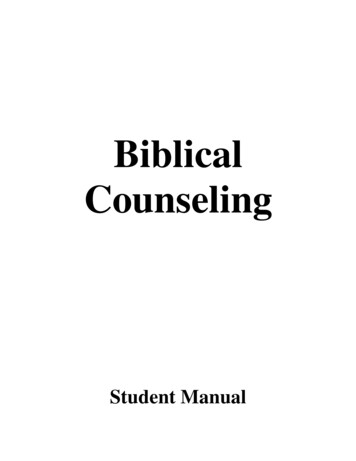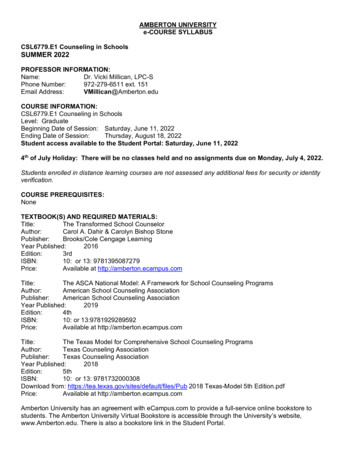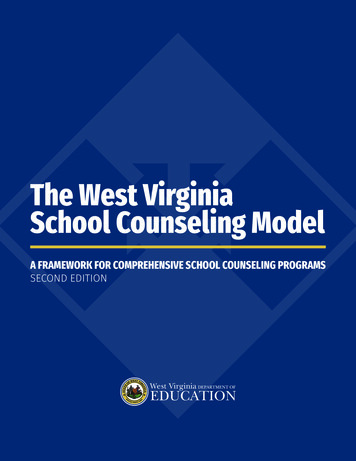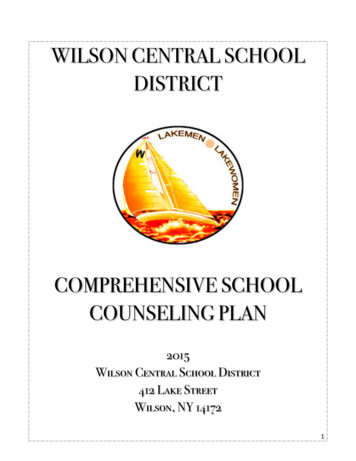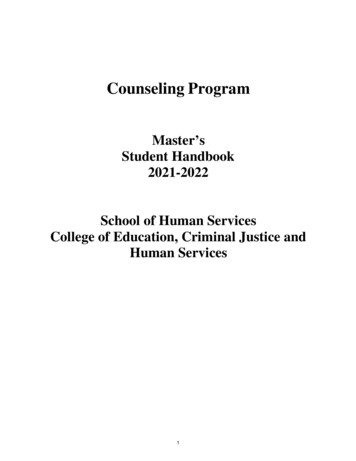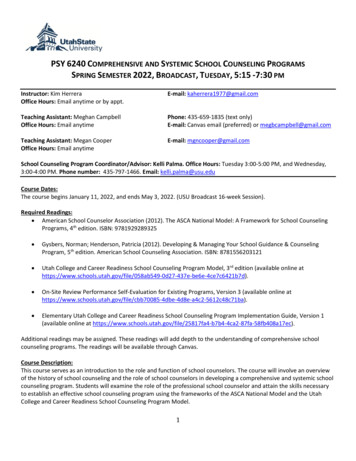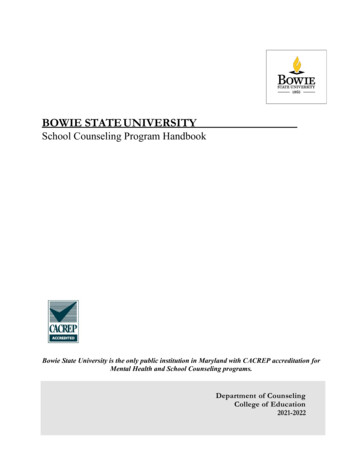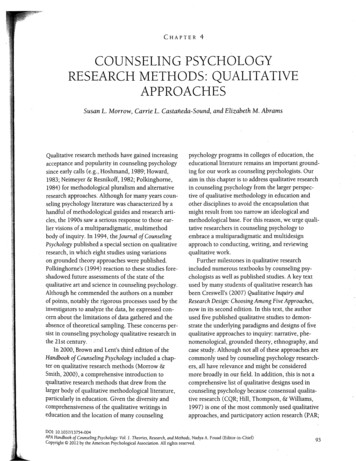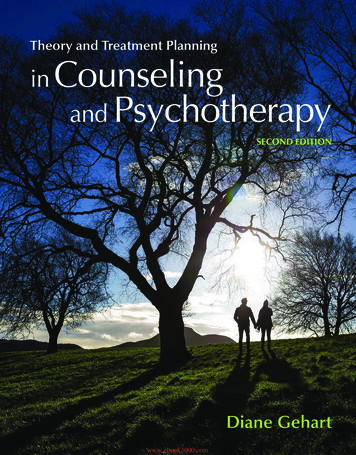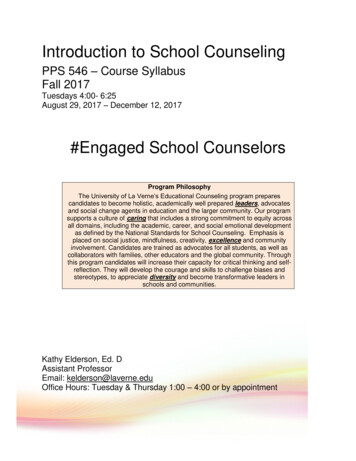
Transcription
Introduction to School CounselingPPS 546 – Course SyllabusFall 2017Tuesdays 4:00- 6:25August 29, 2017 – December 12, 2017#Engaged School CounselorsProgram PhilosophyThe University of La Verne’s Educational Counseling program preparescandidates to become holistic, academically well prepared leaders, advocatesand social change agents in education and the larger community. Our programsupports a culture of caring that includes a strong commitment to equity acrossall domains, including the academic, career, and social emotional developmentas defined by the National Standards for School Counseling. Emphasis isplaced on social justice, mindfulness, creativity, excellence and communityinvolvement. Candidates are trained as advocates for all students, as well ascollaborators with families, other educators and the global community. Throughthis program candidates will increase their capacity for critical thinking and selfreflection. They will develop the courage and skills to challenge biases andstereotypes, to appreciate diversity and become transformative leaders inschools and communities.Kathy Elderson, Ed. DAssistant ProfessorEmail: kelderson@laverne.eduOffice Hours: Tuesday & Thursday 1:00 – 4:00 or by appointment
Course Description-3 Semester Hours (Graduate Credit)This course is an introduction to the profession of school counseling. Emphasis is placed onhistorical foundations, theories, counseling practices, helping relationships, developing skills inindividual and group practices, and legal and ethical issues. The National Model for SchoolCounseling Programs ais introduced. This course cannot be challenged. This course includes25 hours of practicum.California Commission on Teacher Credentialing Standardsfor the School Counseling Pupil Personnel Services CredentialThis course meets or partially meets Standard 3—Socio-Cultural Competence, Standard 17—Foundations of the Counseling Profession, Standard 18—Professionalism, Ethics, and LegalMandates, and Standard 32—Determination of Candidate Competence.The professor reserves the right to modify the syllabus based on student needs.Learning OutcomesBy the end of this course, students should have an understanding of the theories and conceptsthat ground the profession, guide the development of comprehensive school counselingprograms and influence and strengthen best practices. The learning outcomes are aligned withthe CCTC standards and will be assessed through course activities and assignments.Specifically, students will:1. Describe how school counselors work with the school, family, and community to supportand reinforce student learning (S. 3);2. Describe the impact of intentional and unintentional bias and other culturally andinstitutionally supported behaviors on student learning (S. 3);3. Describe the historical and philosophical foundations of the school counseling professionfrom its inception in the U.S. to today (S. 17);4. Summarize how the profession’s history and philosophy impacts current trends andpractices at the state and national level (S. 17);5. Develop a professional identity congruent with professional roles and functions, andprincipals of professional practice (S. 18);6. Describe the themes and four components of the ASCA National Model (S. 18);7. Demonstrate the importance of adhering to sound legal and ethical practices through theapplication of ethical decision making in school settings (S. 18).NOTE: Since the demographics of California public schools are continually changing, it is thepolicy of the Educational Counselor Preparation Program that socio-cultural competence beappropriately addressed in all courses. Socio-cultural competence is defined as involvingcounselor trainees in the continual development of attitudes/beliefs, knowledge, and skillsrelated to: (a) awareness of one’s own assumptions, values, and biases; (b) understanding theworldview of the culturally different client; (c) culturally appropriate intervention strategies andtechniques; and (d) sociopolitical influences that impinge upon the life of racial/ethnic minorities[based on Sue (2001)].2
Required BooksHolcomb-McCoy, C. (2007). School counseling to close the achievementgap: A social justice framework for success. Thousand Oaks, CA:Corwin Press.American School Counselor Association (2012). The ASCA nationalmodel: A framework for school counseling programs (3rd ed.).Alexandria, VA: Author.Recommended BooksAmerican Psychological Association (2010). Publication manual of the AmericanPsychological Association, 6th ed. Washington: Author.American School Counselor Association (2016). The ASCA national model implementationguide: Foundation, management and accountability. Alexandria, VA: Author.American School Counselor Association (2012). Making Diversity Work: Creating CulturallyCompetent School Counseling Programs. Alexandria, VA: Author.Supplemental ResourcesIn addition to the books required for the class, weekly reading assignments will be placed onBlackboard. Please make sure you have completed all required reading prior to class so youare prepared to participate in discussions and activities.Blackboard Course InformationBlackboard is the University of La Verne’s online course managementsystem. A Blackboard account is created for you within 24 hours ofregistration. Blackboard is a user-friendly course communication system.For questions concerning Blackboard, or assistance please contact theBlackboard Administrator at (909) 448-4130, or e-mail atbbhelp@laverne.edu3
Course ExpectationsStudents are encouraged to focus on professional growth. Successful completion of courserequirements and evidence of professional growth will serve as the basis for the final grade. It isthe student’s responsibility to present work that is representative of his/her professionaldevelopment. The grading policy for graduate students indicates that: Students earning an A must exceed expectations in the depth of learning andapplication of subject matter as demonstrated in written and oral communication,reflection and creativity. Students earning a B meet expectations in the depth of learning and application ofsubject matter as demonstrated in written and oral communication, reflection andcreativity. Students earning a C meet minimum proficiency in learning and application of subjectmatter as demonstrated in written and oral communication, reflection and creativity.Assignment ExpectationsIt is expected that all readings and assignments will be completed prior to class. Assignmentsare your professional responsibility; therefore, they should reflect your best work. It is expectedthat you will convey your message in a professional manner using appropriate grammar, syntax,punctuation and spelling. Analysis, synthesis, and evaluation of concepts are expected. Allpapers must be thoroughly proofed, error-free, and submitted on the required due date. Unlessotherwise noted, all assignments should include a cover page, and should be typed in 12-pointfont with 1-inch margins following APA Style (6th edition). Upload all final assignments toBlackboard by 4:00pm on the due date.Assignments must be appropriately labeled and formatted as a Microsoft Word document(details for labeling are listed in the assignment directions).Papers not meeting minimal graduate level quality requirements, as determined by theinstructor, will be returned ungraded for revisions. When revised, these papers will have areduced maximum grade.Late Work PolicyLate work is not permitted and will receive a grade of zero. Exceptions may be made by priorarrangement with the instructor on a case-by-case basis. If an emergency should arise thatimpedes your ability to submit your assignment on time, please contact the instructor as soon aspossible to make arrangements.Writing AssistanceThe Academic Success Center offers a variety of services to students including online writingtutors to help you meet course writing requirements. ibrary InformationGeneral information on how to use the library, and search for books and journal articles can befound at the following link. http://library.laverne.edu/4
University PolicyFor the most up to date information on all university policies and regulations please refer to theUniversity of La Verne catalog.Academic HonestyEach student is responsible for performing academic tasks in such a way that honesty is not inquestion. Unless an instructor specifically defines an exception, students are expected tomaintain the following standards of integrity: All tests, term papers, oral and written assignments, presentations, and all other academicefforts are to be the work of the student presenting the material; Any use of wording, ideas, or findings of other persons, writers, or researchers requires theexplicit citation of the source; use of the exact wording requires a "quotation" format; Deliberately supplying material to a student for purposes of plagiarism is also culpable.Disabled Students ServicesAccommodations are available for students who have a documented disability. Please notifythe instructor during the first week of class of any accommodations needed for the course.Accommodations are coordinated through the Director of Disabled Student Services and remainconfidential within the HIPPA and FERPA guidelines. /Professional PortfolioStudents in the Educational Counseling Program must collect artifacts that demonstrateprofessional growth, achievement, and competence in the field of school counseling. Theportfolio will be a work in progress throughout the student’s professional training and will becompleted during PPS 597-Graduate Seminar in School Counseling. Appropriate for thisportfolio are course products such as course syllabi, key assignments, projects, a philosophy ofschool counseling, and final exams. BE SURE TO PRINT OR SAVE GRADED WORK AND THE SCORING RUBRICFROM TASKSTREAM OR BLACKBOARD FOR INCLUSION IN YOUR PPS 597CULMINATING PORTFOLIO.Professional Standards for School CounselorsThe following standards were developed by the American School Counselor Association(ASCA) and are designed to guide the work of school counselors: The ASCA Mindsets & Behaviors for Student Success: K-12 College- and CareerReadiness for Every Student (2014) ASCA School Counselor Competencies (2012) ASCA Ethical Standards for School Counselors (2016)Weighting of Assignments % Class Participation25o Contributions to class discussiono Written reflectionso Quizzes In-Service Presentation15o Poster5
o Handouto Written paperPracticum Hours20Literature Review10Mid-term10o Personal vision/belief statemento Professional introduction lettero Written examFinal Exam (Portfolio Materials)20o Take home Exam Synopsis of competencies, mindsets, ethics how they will be used inpracticeo In class Elevator speechGrading ScaleA A B B B C C C D 77269REMINDERS:1. The Educational Counseling Program requires students to earn a minimum of a B(3.0) in this foundation class. Students must maintain an overall average of B (3.0) orbetter in all program coursework.2. Incompletes are rarely given and they must be discussed with the instructor prior tothe last day of class.3. The final take home exam is required and must be entered into Task Stream to passthe course.4. Generally, late work is not accepted and will receive a grade of zero. Exceptions aremade on a case-by-case basis and must be arranged with the instructor prior to thedue date.5. Papers not meeting minimum graduate school quality will be returned ungraded forrevisions. When revised, these papers may earn a maximum grade of B.6
CLASS PARTICIPATION 25 points Description of Activity:The readings and classroom activities provide foundational knowledge for future schoolcounselors. During the semester you will have multiple opportunities to reflect on your role as aschool counselor and integrate new knowledge and experiences into your emergingprofessional identity.If you have an emergency (such as death in the immediate family or personal illness) and mustmiss a class, it is your responsibility to meet with the instructor and contract for making up thetime and work. Students that develop a pattern of inappropriate participation or non-attendancemay be dropped from the program. Required readings must be completed before class. Beingprepared supports discussion and activities, and assures maximum class participation points.What You Will Do: Weekly reading, quizzes, discussion and classroom activities as assigned.Resources: Textbooks listed in the syllabus & articles posted on BlackboardHow You Will Be Assessed: Contributions in class –o It is an expectation that students will attend all classes and actively participate byrespectfully listening to others and sharing their opinions and values. As graduatestudents, you will be expected to lead and fully participate in our classdiscussions and activities.Written reflections –o Written reflections must be completed before class. They pertain to the assignedweekly readings and contain your reactions, thoughts, ideas, and questions.Journal reflections must be at least 300 words in length. There are norequirements for formatting (bullet points are ok), although reflections should befree from spelling and grammatical errors. Journal reflections should be uploadedto Blackboard by 4pm on the day of class.Quizzes –o Quizzes must be completed before class on Blackboard. They pertain to theassigned weekly readings.7
IN-SERVICE PRESENTATION 15 points Description of Activity:Engaged school counselors are critical partners in providing information to students for theirfutures, helping families navigate the educational system, and supporting teachers and staff inmaximizing student learning. One of the primary activities of an engaged school counselor issharing their professional expertise. The presentation assignment will provide you with anopportunity to gain experience in presenting information at teacher/school counselor in-services,parent meetings and providing results reports to school boards or other stakeholders.What You Will Do: Create a poster displayCreate a flyer in piktochartComplete a 3-page written paperResources: Library - You will need to identify empirical research, policy, legal, ethical considerationsand data that are important to your topic.ASCA websiteHow You Will Be Assessed: Poster display –o Create a visually appealing poster that helps your fellow school counselorsunderstand the importance of your topic. Questions your poster may answerinclude: Why is the information valuable? Build a case for the importance ofyour topic; What is in it for them? Help your audience understand why theinformation relates to them and/or why they should care. How does thisinformation support the school mission or student outcomes; What do you want them to do? How will they use the information? Create a flyer in piktochart –o Create a visually appealing 3-section info graph on your topic in piktochart andsubmit the link in Blackboard. Include the following sections in your piktograph: Header Overview of your topic- 100-120 words (must be original) Additional online links to the topic Complete a 3-page APA formatted paper on your topic (excluding cover page &bibliography)8
ooInclude a bibliography- minimum of 5 journal articles and 3 additional high qualityresources. The ASCA website provides a good starting point for your search;however, your bibliography must expand what you found on the ASCA website.Submit your paper to Blackboard as a word document attachment. Name your file as follows: Lastname.First Name-inservice (eg.Elderson.Kathy-inservice)PRESENTATION TOPICS:Academic1. Classroom management for school counselors2. Dropout prevention/motivation/academic achievement3. Grade Level Transitions4. Service learning5. Special education/gifted & talented programsSocial emotional6. Abuse/reporting procedures7. Anger management8. Behavioral Challenges-RTI/PBIS9. Bullying/relational aggression/conflict resolution10. Crisis/trauma/violence11. Death/dying/grief/divorce/deployment12. Homeless/Foster children13. LGBQT14. Mental health issues-anxiety, depression15. SEL-culture of caring/character educationCareer16. Building a college going culture17. College prep/postsecondary planning18. College applications/letters of recommendation19. Ed plans/transcripts20. Financial aid/scholarships/college decision21. FAFSA22. National Association for College Admission Counseling23. NCAA9
PRACTICUM HOURS & REFLECTIONS 20 points Description of Activity:The California Commission on Teacher Credentialing requires School Counseling programcandidates to log 100 hours of practicum in relevant activities prior to beginning 600 hours offieldwork. The practicum is divided into increments of 25 hours to be completed in each of thefollowing four courses:PPS 546-Introduction to School CounselingPPS 571-Individual Counseling SkillsPPS 549-School Counseling TheoriesPPS 572-Group Counseling SkillsThe purpose of practicum is to gain additional information on the field of school counseling.Practicum offers an opportunity for you to begin establishing your professional identity within theeducational community. Practicum experiences occur in a variety of settings (classroom,laboratory, conferences, etc.), and provide additional opportunities for understanding thepractical application of theories and development of skills being studied. Practicum providesmultiple opportunities to network prior to selecting your fieldwork sites. Completion of 25 hoursof practicum is required in order to receive a grade for this course.What You Will Do: Educational Counseling candidates must complete 25 hours of practicum in order toreceive a grade for this course.Create a plan for completing 25 hours of practicum. Your plan must include the name ofthe organization or school sites where the practicum will be completed and dates forscheduled activities, with no more than 12.5 hours in any one activity logged for theentire 100 hours of practicum.The following activities are required:o Interview and shadow a school counselor at 3 different educational levels.The following activities may be included in your plan but are not required. Remember, nomore than 12.5 hours in any one activity may be logged for the entire 100 hours ofpracticum.o If you are NOT a teacher, you may include observing classroom instructionfor a maximum of 6 hourso Personal and career assessments completed through a Career Servicesoffice.o Observe or participate in school-based or community service programsserving parents and families;o Attend local, state, national, or international meetings and conferencesrelating to school counseling and other appropriate topics.Resources: Below are some suggested activities to get you started.o LEAD conference https://sites.laverne.edu/civic-and-community-10
nt-conference-2016/CASC Conference entid 99ASCA online Professional Development series [ 99 for members] (you maycomplete one webinar per 100 hours of practicum) and it can count for amaximum of 12.5 hours s/professional-development/asca-uoHow You Will Be Assessed: Submit your plan for 25 hours of practicum to Blackboard as a word documentattachment.o Name your file as follows: Lastname.First Name-practicum.plan (eg.Elderson.Kathy-practicum.plan) Bring completed and signed practicum logs and worksheets to class on the date due.o The practicum logs & worksheets will be returned to you for inclusion in yourProfessional Portfolio in PPS 597-Graduate Seminar in School Counseling.o Practicum worksheet and logs are located on the class Blackboard site.11
LITERATURE REVIEW 10 points Description of Activity:A literature review provides an opportunity for students to evaluate and respond to empiricalresearch. Evaluating strengths, weaknesses, and applicability of research to practice is avaluable skill for all educators. Practicing school counselors use this skill to identify new ideasrelevant to the field and current best practices applicable to their educational setting.What You Will Do: Write literature reviewResources: Articles will be posted on Blackboard LibraryHow You Will Be Assessed: Select one of the articles posted on Blackboard. Watch a video posted on Blackboard. Identify 2-4 journal articles that are not part of the Blackboard list to extend yourknowledge related to the article subject. Write a maximum 4-page literature review (excluding cover page & bibliography)following APA styleo Include the following on the cover page Your name, student ID, date APA citation for the article you selectedo Body of paper must include: Introduction summarizing the article (maximum one page) Evaluation of the main points Conclusiono Bibliographyo Submit your paper in Blackboard as a word document attachment. Name your file as follows: Lastname.First Name-Lit.Review (eg.Elderson.Kathy-LitReview)12
MID-TERM 10 points Description of Activity:Learning is enhanced if we are given a chance to reflect, review, and personally relate to thematerial we are learning. Age theorists remind us that the older we become the more reflectiveand informed our learning becomes (Trotter, 2006). This assignment will give you an opportunityto reflect on and assess your personal and professional growth as a pre-service schoolcounselor. In this paper you will (1) demonstrate a thorough understanding of the role of theschool counselor and (2) demonstrate ability to self analyze personal development andprocesses that have promoted growth. This is not a group project.What You Will Do: Write a 2 page paper outlining your beliefs on student achievement Develop a school counseling program vision statement Write a professional introduction letter (cover letter) Complete an exam on foundational challenges related to current professional issuesResources: Course readings, projects, discussion & classroom activities ASCA National ModelHow You Will Be Assessed: Write a 2 page paper outlining your beliefs on student achievement Describe the purpose and importance of your vision on student learning.o Based on the in class activityo Submit your papers in Blackboard as a word document attachment. Name your file as follows: Lastname.First Name-Beliefs (eg.Elderson.Kathy-Beliefs) Develop a school counseling program vision statemento Submit your papers in Blackboard as a word document attachment. Name your file as follows: Lastname.First Name-vision (eg.Elderson.Kathy-vision) Include your own school counseling vision. Must be original work. Write a professional introduction letter (cover letter)o Submit your papers in Blackboard as a word document attachment. Name your file as follows: Lastname.First Name-letter (eg.Elderson.Kathy-letter) Complete a take home exam on foundational challenges related to current professionalissueso This will be posted in Blackboard13
FINAL EXAM 20 Points Description of Activity:The final exam has two parts: a written paper and an oral presentation. The final exam willassess your cumulative knowledge and ability to apply, analyze, and evaluate course material.The final exam will give you an opportunity to illustrate your ability to develop a cutting edgecomprehensive school counseling program that embodies advocacy, leadership, andcollaboration as it creates systemic change.What You Will Do: Complete 2 part written paper Oral presentationResources: Course readings, projects, discussion & classroom activities.o The ASCA Mindsets & Behaviors for Student Success: K-12 College- and CareerReadiness for Every Student (2014)o ASCA School Counselor Competencies (2012)o ASCA Ethical Standards for School Counselors (2016)How You Will Be Assessed: Written Paper - Part I (submit to TaskStream & Blackboard)o Write a synopsis (1.5 page maximum for each area) for each of the followingASCA standards and describe (3 page maximum for each area) how you will usethem in practice: The ASCA Mindsets & Behaviors for Student Success: K-12 College- andCareer Readiness for Every Student (2014) ASCA School Counselor Competencies (2012) ASCA Ethical Standards for School Counselors (2016)o Submit your papers in Blackboard as a word document attachment. Name your file as follows: Lastname.First Name-part1 (eg.Elderson.Kathy-part1) Written Paper - Part II (5 page maximum) (submit to TaskStream & Blackboard)o Prepare a personal philosophy on how you will work with the school, family, andcommunity to support and reinforce student learningo Submit your papers in Blackboard as a word document attachment. Name your file as follows: Lastname.First Name-part2 (eg.Elderson.Kathy-part2 Oral Presentation14
oYou’re wearing a school counseling shirt with the word “guidance” marked out,You find yourself in an elevator with the Superintendent of your school district,he/she asks you what the difference is between a “guidance counselor” and a“school counselor.” In 90 seconds explain the difference and advocate for theprofession of school counseling.TASK STREAM SUBMISSION REQUIRED FOR THE FINAL EXAM PAPER The University of La Verne’s La Fetra College of Education (LFCE) uses TaskStreamsoftware for the submission and evaluation of key assessments throughout the program.These assessments vary by course. You will receive information about requiredassessments from professors teaching the key assessment courses. Writteninstructions and video demonstrations for using TaskStream can be found on the LFCETechnology webpage. http://sites.laverne.edu/ceol-tech/15
COURSE CALENDARREFER TO BLACKBOARD FOR WEEKLY ASSIGNEMENTS & READINGS THAT NEED TOBE COMPLETED BEFORE CLASSDateWeek #18/29/17TopicsWelcomeDiscussion Board activityHistory of Education/School CounselingWhat Is The Purpose Of -Purpose-ofEducation%C2%A2.aspxA Nation at Risk https://www2.ed.gov/pubs/natatrisk/risk.htmlWeek #29/5/17Week #39/12/17Week #49/19/17Race to the tivesummary.pdfHistory of Education/School CounselingReflectionLibrarianThe Helping Profession DiscussionSC HistoryWhat is the role of the school counselor?ASCA School Counselor Competencies.History of Education/School CounselingCurriculum labQuizSC HistoryFLOTUS Address @ ASCAJournal ReflectionArticle: A Closer Look at the Principal-Counselor RelationshipPolicy Letter from Arne DuncanArticle: Make Your Mark (pp. 27-31 only)Ethical StandardsHttps://www.youtube.com/watch?V dia/asca/Ethics/ethicalstandards2016.pdf1. Capuzzi, D. (2002). Legal and ethical challenges incounseling suicidal students. Professional SchoolCounseling, 6, 36-45.2. Glosoff, H. L., & Pate, R. H. (2002). Privacy andconfidentiality in school counseling. Professional SchoolCounseling, 6, 20-27.3. Hermann, M. A. (2002). A study of legal issuesencountered by school counselors and perceptions of their16
Week #5 ONLINE CLASS9/26/17Week #610/3/17Week #710/10/17Week #810/17/17Week #910/24/17preparedness to respond to legal challenges. ProfessionalSchool Counseling, 6, 12-19.4. Mcfarland, W. P., & Dupuis, M. (2001). The legal duty toprotect gay and lesbian students from violence in school.Professional School Counseling, 4, 171-179.5. Remley T. P., & Huey, W. C. (2002). An ethics quiz forschool counselors. Professional School Counseling, 6, 310.6. Stone, C. (2002). Negligence in academic advising andabortion counseling: Court rulings and implications.Professional School Counseling, 6, 28-35.IntersectionalityEquity ActivityHow do we define intersectionality?What do we know about the history of RACE in America?Map–history timeline aligned with changes in SC professionUnintentional Bias Youtube video- check your assumptionsProvide an overview of the school’s population and outcomedata, disaggregated by relevant subgroups. Include thefollowing: Name and website of real school (include all data sources) Total number of students Grade levels served % Low Income % Diverse Learners % English Language Learners Mobility Rate Race/Ethnicity Average Daily Attendance Student Misconducts/Suspensions/Expulsions Any outcome data metric(s) of your choosing, disaggregatedby relevant subpopulationTed Talk: Color Blind or Color Brave?Article: The Emerging Connection GapEquityLit Review DueIn Class Belief Exercise For Mid-Term AssignmentDiscussion of data disaggregation. What gaps in achievementdid you find? What are your recommendations for how theschool counselor can address those gaps? Must be youroriginal work.Poster PresentationsMid-TermEquity (closing the achievement gap)Reflection-Answer Book Questions On Lg. Poster Papers InClassCASC ConferenceASCA THEMES ACTIVITYArticle: Who is your most important client?Article: Compassion Fatigue17
Week #10 ONLINE CLASS10/31/17Week #1111/7/17Week #1211/14/17Week #1311/21/17 RESEARCH WEEKWeek #1411/28/17Week #1512/5/17Week #1612/12/17ASCA ModelQUIZMINDSETS & BEHAVIORSWrite 3 S.M.A.R.T. goals that address the needs of yourschool’s population - one goal per domain (academic,social/emotional, career).Create a core curriculum action plan using the ASCA RAMPtemplate. The action plan should clearly address the gaps andissues you uncovered and should support your S.M.A.R.T.goals. Must be your original work. Cite any sources used.ASCA ModelSpeakerASCA ModelReflectionDirect & Indirect Student Services ActivityCreate a core curriculum action plan using the ASCA RAMPtemplate. The action plan should clearly address the gaps andissues you uncovered and should support your S.M.A.R.T.goals. Must be your original work. Cite any
School counseling to close the achievement gap: A social justice framework for success. Thousand Oaks, CA: Corwin Press. American School Counselor Association (2012). The ASCA national model: A framework for school counseling programs (3rd ed.). Alexandria, VA: Author. Recommended Books American Psychological Association (2010).
